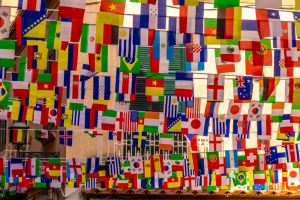Globalization is not a buzzword anymore. It’s especially true for events, and hosting international events in today’s interconnected world has become increasingly common.
Even if you plan for events domestically, there will likely be attendees from different countries. The pandemic has also helped increase the popularity and prevalence of global events through virtual events.
Whether it’s a business conference, a trade show, or a cultural festival, organizing events on a global scale requires careful planning and consideration. Event planners must be aware and mindful of cultural differences if they want their attendees to feel at ease.
Successfully navigating international events involves addressing various challenges, including cultural differences, logistical complexities, and language barriers.
This article will explore tips and strategies to help you plan and execute global events.
Research the target market and cultural sensitivities
When planning an international event, conducting thorough research on the target market and understanding the cultural sensitivities of the host country or region is crucial. Cultural norms, traditions, and customs can significantly impact event planning and execution.
Familiarize yourself with local practices, etiquette, and any potential taboos to ensure a respectful and inclusive event experience.
For instance, seating arrangements, greetings, and even the choice of colors can carry deep cultural meaning, and failing to consider these subtleties can lead to misunderstandings or unintentional offense.
Furthermore, incorporating traditions and customs into your event can create a more authentic and engaging experience. Whether it’s traditional music, dance, or cuisine, these elements can captivate attendees and foster a deeper appreciation for the local culture.
Lucrezia Carnelos—Unsplash
Navigating potential taboos is another pivotal aspect of international event planning. Every culture has its own set of sensitive topics or actions that should be avoided. These can range from avoiding certain gestures or symbols to refraining from discussing contentious issues.
One especially critical consideration is respecting religious restrictions, as different religions have specific requirements and practices that may impact event planning.
Build local partnerships
Establishing strong local partnerships is key, and collaborating with local event planners, vendors, and suppliers can provide invaluable insights into the host country’s event landscape.
Professional organizations, such as Convention Visitor Bureaus (CVBs) and Destination Marketing Organizations (DMOs) or their local equivalent, with their knowledge of the local market, can assist with navigating bureaucratic procedures, sourcing local resources, and understanding logistical intricacies. Working with local professionals also helps build trust and credibility with the target audience.
And let’s suppose you don’t know where to start. In that case, attending industry trade shows such as IMEX can represent an excellent opportunity to explore what different destinations offer and meet a wide range of CVBs and DMOs from around the globe.
Hire professional interpreters and translators
Language barriers can pose significant challenges during international events, and failing to address the issue will have you run the risk of losing the interest of numerous potential attendees.
To overcome this hurdle, hiring professional interpreters and translators who are fluent in both the event’s and the local languages is essential.
Jacquline Brandwayn—Unsplash
Accurate and timely interpretation ensures effective communication and fosters a positive experience for attendees from diverse linguistic backgrounds.
Consider time zones and holidays
Awareness of time zones and local holidays becomes paramount when orchestrating international events. Failure to do so may result in a scheduling conflict as the event might unintentionally coincide with a local holiday or clash with other significant regional happenings. Meticulous planning is therefore required to ensure that the chosen event dates align with the convenience of attendees and avoid any overlap with major holidays or cherished local celebrations.
San Fermin Pamplona—Navarra—Unsplash
Furthermore, consider time zone differences when setting event schedules, especially for virtual or hybrid events where participants from around the world are expected to join. Think about offering on-demand content.
Managing time zone disparities ensures that attendees can engage seamlessly without the constraints of geographical boundaries, enhancing the event’s accessibility and appeal.
Beyond mere logistics, respecting local time zones and holidays reflects a more profound commitment to cultural sensitivity and inclusivity.
Customize marketing and communication strategies
Tailoring your marketing and communication strategies to suit the local audience is also essential.
Be mindful of cultural nuances and preferences when crafting promotional materials, advertisements, and online content. Language is, indeed, a powerful tool, and translating content accurately is just the beginning. Understanding the idiomatic expressions, humor, and symbolism that resonate with the local audience can lead to more impactful messaging.
Engaging with local media outlets and social influencers can help generate buzz and increase event visibility in the target market.
Collaborations can provide valuable insights and connections, helping you navigate the intricacies of the local market.
Don’t forget to tailor your social media content not only for language but also for platform preferences. Some regions might favor specific platforms over others, and adapting your strategy accordingly can yield better engagement.
Help your attendees secure proper visas and documentation
For attendees traveling internationally to your event, it is crucial to provide clear guidance on visa requirements and assist them in obtaining the necessary documentation. Collaborate with immigration consultants or legal experts to ensure attendees have a smooth entry process.
Nick Fewings—Unsplash
You might consider offering a comprehensive visa support program, including resources on visa application procedures, contact information for embassies and consulates, and guidance on interview preparations. This proactive approach enhances the attendee experience and demonstrates your commitment to facilitating a seamless international event. Additionally, consider organizing pre-event webinars or informational sessions on navigating visa processes, easing anxieties for prospective attendees.
Keep abreast of any changes in visa policies and communicate them effectively to prevent any last-minute complications. This way, your attendees are well informed and prepared for hassle-free entry, further enhancing the event’s appeal on the global stage.
Understand local event regulations and permits
Each country or region has its own set of event regulations and permit requirements.
Familiarize yourself with the local rules governing events to ensure compliance. Obtain the necessary permits well in advance and allocate sufficient time for the approval process. Adhering to local laws and regulations is crucial for avoiding penalties, ensuring the safety of attendees, and maintaining a positive reputation.
Once again, local professional organizations can help you navigate the intricacies of local regulations.
Adapt to technological differences
Technology is crucial in event planning and execution, but technological capabilities vary across regions. Ensure your event’s technology infrastructure aligns with the host country’s technological landscape. Verify the availability of high-speed internet, access to necessary software and equipment, and any potential technical limitations that may impact your event’s success.
It’s essential to conduct thorough due diligence regarding local technology providers and support services. Having reliable local partners can be invaluable, ensuring quick troubleshooting and technical assistance in case of unforeseen issues.
Additionally, consider the digital preferences of the target audience. Some regions might have a stronger affinity for certain social media platforms or communication apps. Adapting your tech-driven engagement strategies to cater to these preferences can enhance audience participation and interaction.
Cybersecurity is another critical aspect to ponder. Different regions may have varying levels of digital security awareness and protocols. Ensuring robust data protection measures and educating both your team and attendees on cybersecurity best practices can safeguard sensitive information.
In conclusion
Organizing international events requires careful consideration of cultural differences, logistical complexities, and language barriers.
You can successfully navigate these challenges by conducting thorough research, building local partnerships, and customizing marketing strategies. Additionally, prioritizing effective communication, cultural integration, and adherence to local regulations will contribute to a memorable and successful global event.
Embrace the opportunities that international events offer for cross-cultural exchange, learning, and collaboration, and create an inclusive and impactful experience for attendees worldwide.
Author: Véronique Colombani





